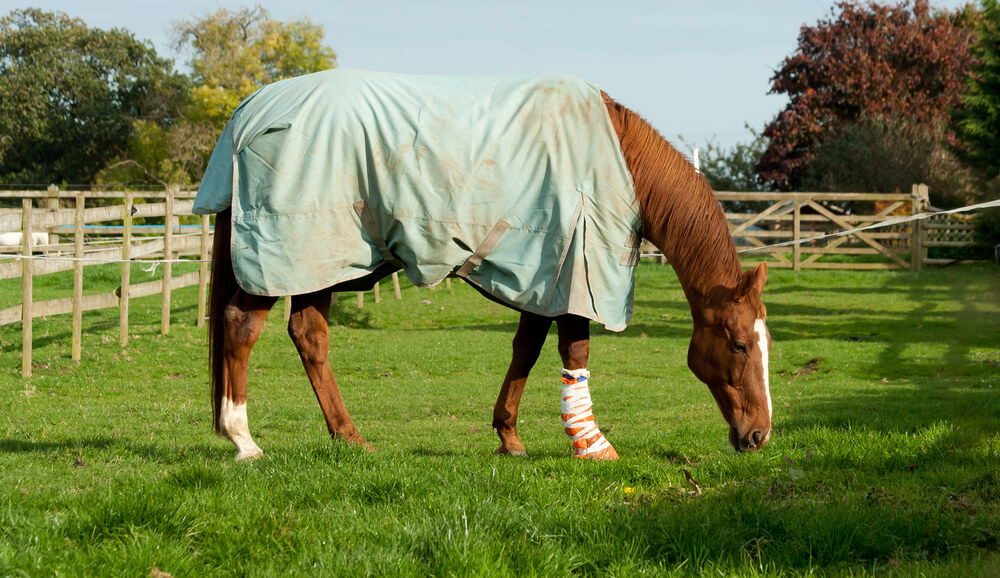The digestive microbiome and environment are very important contributors to health and soundness in the horse. In fact, one could conclude from research on the human side that the digestive microbiome IS the key to health and soundness. This concept has been explored in equine medicine and it was about 10 years ago that we demonstrated abnormal bacterial growth patterns in metabolic horses, yet, the concept has just not taken hold in the industry as it should. One key group of horses that are impacted by gut health imbalances are the obese or metabolic syndrome patients.
The concept of digestive health and the microbiome in the horse is not a new topic, but has been slowly explored compared to the human side of things. About 10 years ago, we performed over 300 fecal cultures on horses that were overweight and impacted by a variety of issues ranging from allergies to metabolic problems. In those studies, it was quite apparent that this overweight group had higher growth levels of lactic acid bacteria compared to leaner and healthier horses. This imbalance is seen in human studies and heavily contributes to systemic inflammation and many problems from diabetes to cancer and cardiovascular disease.
Recently, I was flipping through a recent copy of the American Journal of Veterinary Research and was pleased to see a research article titled “Fecal extract from obese horses induces an inflammatory response by murine macrophages in vitro.” This was taken from the May 2022 edition of the AJVR, Page Roth et al.
The conclusion to this paper is very relevant and states, ” The increased levels of inflammatory markers induced in marine macrophages by the microbiome of obese horses in vitro suggested important differences in the enteric microbial composition of these horses compared to non-obese horses. Overall, this study showed that the microbiome may play a role in mediating an inflammatory response within the digestive tract of obese horses.”
What does all of this mean? Essentially, in the study they took feces from obese horses and non-obese horses, then diluted them with water, spun them down and then took the fluid and exposed macrophages to it in suspension. Macrophages are one type of cell involved in the immune response and are capable of producing pro-inflammatory chemicals. After exposure to the non-obese horses, the macrophages were essentially unchanged in their activity, however, after exposure to the obese horses’ fluid, the macrophages began to secrete inflammatory proteins. Thus, there is ‘something’ in that fluid that stimulates those cells to become aggressive, irritated, and inflamed. That ‘something’ is either harmful byproducts produced by the imbalanced bacterial microbiome, or it could be inflammatory chemicals being produced by the immune system in the digestive tract, which then ignites other cells when exposed.
In human research, they note that the altered microbiome not only induces a local immune response, but chemicals produced or not produced by the altered microbiome, are capable of inducing a whole-body or systemic inflammatory response. This is especially noted when there is ‘leaky gut syndrome’ and increased permeability of the gut with leakage of LPS endotoxin.
This overall concept or connection between gut health and whole body health or status of inflammation is not new and is something I have tried to convey to most of our readers and clients. In fact, it is so important that more times than not in my consults, I put emphasis upon it as the first line thing to address, even in cases of joint pain.
The overall point here is that the obese horse, which generally speaking is the standard overweight or easy keeper horse, is experiencing digestive microbiome imbalances and those imbalances are what are creating the sore feet, the overweight body condition, the laminitis, the insulin resistance, the allergies, and more than likely the Cushing’s syndrome or elevated ACTH. That imbalance is something that was created and it is not an infection of sorts. It was created by the owner through feeding methods, lifestyle, stress, lack of turnout, improper supplementation, and over-medication.
The digestive dysbiosis or imbalance is readily apparent just by looking at feces in a photo during my consultations. Sometimes the feces are solid, sometimes they are loose, but most will have a glistening surface of mucous and more times than not, they are brown in color rather than green, and often exude a sweet odor. Once you are able to recognize this in your horse, then the ‘root’ problem is revealed. If you are battling a health condition in your horse, and managing a complicated regimen of all sorts of supplements and probiotics, then in truth, the regimen is not working and could actually be contributing to the issues.
The key to managing most of these cases is to STOP doing what you are doing, step back and re-evaluate everything. Then start over with a new perspective. This means higher quality forage, increased turnout, less stress, no grains, minimal to no synthetic based supplements, and increased exercise. This is one of the hardest things to do for most of my clients in consultations, even though it is the most logical.
It is interesting to see how many metabolic horses just respond to an increased forage quality diet, increased turnout, no grains and only one supplement which targets the digestive health and microbiome. Many horses are able to accomplish this feat with either the Cur-OST EQ Tri-GUT or the Cur-OST EQ Tri-Guggul. That’s it, nothing more and nothing less.
If you have an obese, overweight, or easy-keeper horse with health issues, take a step back and re-evaluate what you are doing. You could just be making matters worse rather than better.
Author: Tom Schell, D.V.M, CVCH, CHN



Thank you for taking the time to share your thoughts and your experiences. There are so many different feed options being presented and diets followed I am often ridiculed for following the simple approach. In fact, I was bared from a barn because I would not feed “grain”.
I don’t know if it was you or not but someone said 80% of the problems horses have originate in the gut and I have come to believe that. It is not intuitive that you need to nourish and care for the microbiome.
You have often talked about evaluating manure and I do that to the extent I can but this could be great YouTube instructional video. Especially squeezing a drop of water out. Could go viral.
I saw this today and thought it was interesting in light of the suggested feeding.
Poll from TheHorse.com
519 responses.
How often do you feed your horse his concentrate, complete feed, or grain?
Once a day
23.20%
(119 votes)
Twice a day
54.58%
(280 votes)
Three or more times a day
8.77%
(45 votes)
I don’t feed my horse concentrate, complete feed, or grain.
13.45%
(69 votes)
Dr. Schell, so much of this describes my mare. She was on an all forage diet and spending 8 hours per day in turnout when I tried her on Tri-Gut last year and it did not go well. I recently ordered Total Support for her and am just initiating step 1 of your 2019 suggested IR regimen, with a plan to fillow through the successive steps as needed. Reading this, I am wondering if I should have instead tried Tri-Guggul. Does this communication supplant the 2019 article series recommendation? She had been getting minimal processed pellet mixes in addition to her 20+ pounds of hay per day, along with 5 days per week exercise and 7 days per week turnout for 7-9 hours per day. I have replaced the pellet mixes with alfalfa pellets, and am starting the Total Support, even as I phase out Metformin and HistallH.
Its a possibility that the Tri-Guggul would have been more effective, but that is hard to tell without knowing more about the horse. The Total Support is definitely a good start and if you feel like she needs more, you could add in the Tri-Gut or Tri-Guggul to help balance out the microbiome. If you have any more in depth questions, Dr. Schell does consults and could dive in to any issues that she’s got going on!
I am in the UK. Would love to be able to buy your products. Please let me know if they become available. Thanks
Reach out to us via email and we can connect you with out UK supplier!